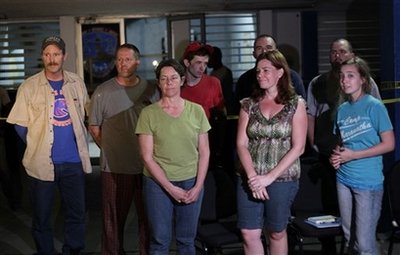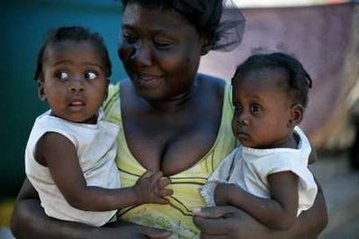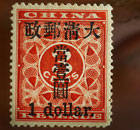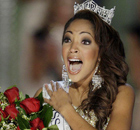Global General
Americans in Haiti to face kidnapping charges
(Agencies)
Updated: 2010-02-02 09:52
 |
Large Medium Small |
PORT-AU-PRINCE: Haitian authorities questioned a group of 10 American missionaries on Monday who are accused of illegally trying to take children out of the quake-shattered Caribbean country.
A prosecutor met with the Americans at police headquarters in Port-au-Prince, where they have been held since they were arrested late on Friday trying to cross into the Dominican Republic with a busload of 33 children they said were orphaned by the devastating January 12 earthquake.
|
 In this Saturday, Jan. 30, 2010 file photo, Americans, from left: Steve McMullen, Jim Allen, Carla Thompson, Silas Thompson, Paul Thompson, Laura Silsby, Drew Culberth and Nicole Lankford stand at police headquarters in the international airport of Port-au-Prince. Haitian officials said Monday, Feb. 1, 2010 that they are thinking of sending the US Baptists to the United States for prosecution after they were arrested trying to take 33 children out of the country without government permission. [Agencies] |
The Baptist missionaries deny Haitian charges they were engaged in child trafficking and insist they were only trying to help vulnerable orphans left destitute by the quake.
The case could be diplomatically sensitive at a time when the United States is spearheading a huge relief effort to help hundreds of thousands of Haitian quake victims, and as US aid groups pour millions of dollars of donations into Haiti.
The US military on Monday resumed medical evacuation flights of critically injured earthquake victims to the United States, ending a five-day suspension caused by a dispute over where to treat patients and who would pay for their care.
The aircraft carrier USS Carl Vinson and two other US ships were leaving Haiti after completing their relief missions. Several other US warships remained offshore to support the operation.
Edmond Mulet, acting head of the UN peacekeeping force in Haiti, told Reuters in an interview it could take Haiti decades to recover, but that the tragedy provided an opportunity for Haitians to rebuild their country "the right way."
Mulet said the world community "should do better" at assisting Haiti's long-term development and that job creation and development programs were needed to fight endemic poverty.
But it was also a chance for Haitians to think about their own responsibilities and "refound their republic," he said.
'GOD'S PURPOSE'
Haitian authorities have expressed fears the chaos and loss caused by the earthquake that killed up to 200,000 people could allow child traffickers to prey on vulnerable children.
Government officials said the detained Americans had no documents proving the children were orphans or giving them permission to take them out of the country.
|
 A woman carries her twin babies in a makeshift camp in downtown Port-au-Prince February 1, 2010. [Agencies] |
Lassegue said it was possible the five men and five women could be sent home for trial because of the damage inflicted on the Haitian judicial system by the quake.
"We tell all Americans all over the world 24 hours a day that you are subject to the laws of the country where you find yourself," the US consul general in Haiti, Donald Moore, told reporters on Monday.
Moore said the missionaries were "being processed according to the Haitian penal system." He had no comment on whether Haiti had been in contact with the US government about moving the case to the United States.
Evidence emerged that many of the 33 children intercepted with the missionaries were not orphans.
Haiti's police said some of them were handed over voluntarily by their parents. A woman at police headquarters who said she was the mother of five of the children said a local pastor acting as an intermediary told her they would have a better life if they went with the missionaries.
The Americans, who admit they had no documents, approvals or passports for the Haitian infants, insist they just wanted to help them by taking them over the border to an orphanage they were establishing in the Dominican Republic.
"They really didn't have any paperwork ... I did not understand that that would really be required," the leader of the group, Laura Silsby, told CNN. The children included a baby and other youngsters up to age 12.
"God is the one who called us to come here and we just really believed that this was his purpose," said Carla Thompson, another member of the group, which called itself the New Life Children's Refuge.
Haitian Prime Minister Jean-Max Bellerive, who has cited reports of child trafficking and even human organ trafficking since the quake, has called the arrested Americans "kidnappers." But he has acknowledged the possibility they were misguided but acting in good faith to help the children.
The case of the Americans resembles that of a group of French charity workers who were detained in Chad in 2007 and accused of trying to fly 103 children out of the African country without authorization.
The six French members of the Zoe's Ark group said the children were "war orphans" from Sudan's Darfur, but UN officials said many were Chadian and were not orphans.
Chad initially sentenced the six to hard labor terms, but they were subsequently repatriated to France and released after a pardon granted by the Chadian president.












